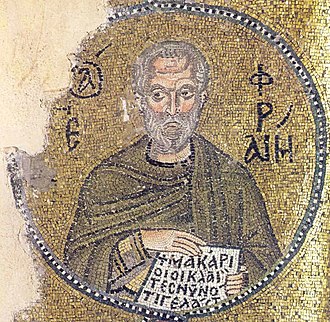(We missed Saint Ephraim on his post-1969 feast of June 9th, so here are a few words on the great Syrian mystic on his pre-1969 traditional date of June 18th).
In the Church universal, we celebrate the life of Saint Ephraim, often called the ‘Syrian’, who is also venerated amongst the Orthodox (on January 28th). He was a deacon, theologian, mystic, exegete, hymnographer – his extant hymns alone number over 400, and there are likely many that are lost – and all-round saint, who died ministering to the plague victims when in his sixties, in the year 373, the same year as the great bishop Athanasius. They were both inveterate foes of Arianism and the rest of the Christological heresies – Marcionites, Manichees and Bardaisanites, to name but a few of the others – floating through the air like noxious soup during that tumultuous fourth century, when the nature of Christ, and the Church, was being clearly defined, culminating in the great Councils of Nicaea (325) and Constantinople (381) – with Ephesus (431) and Chalcedon (451) to follow. Saint Ephraim was declared the 24th Doctor of the Church (there are now still only 36) by Pope Benedict XV on October 5th, 1920
Ephraim participated in neither council during his life – he was too young for the first, born in 306, and already gone to heaven for the second. But his hymns, sermons, writings, and commentaries on Scripture did immense good not just in solidifying and clarifying doctrine but, particularly his hymnody and poetry, much of which is still used in the Syrian liturgies, making that teaching beautiful and harmonic. He was called during his own lifetime the ‘harp of the Holy Spirit’. Beauty will save the world, wrote his Dostoyevsky, and it certainly does a lot more than ugliness, brutality and coercion.
Here is one example of Ephraim’s hymns, ‘To the Light’:
The truth is indeed beautiful, and should be presented so, and it is a significant problem in our modern world that it is too often not, shrouded and concealed beneath hypocrisy, deceit, fear and outright scandal. May Saint Ephraim’s intercession and example teach us that beneath the tumult, waves, wars and persecutions of this world, the peace of that truth of Christ reigns, and we should immerse ourselves therein.
Sic cantemus!, so let us sing, with Ephraim, in our hearts but also with our voices, what beautiful hymns, motets, canticles and antiphons we may know, or may learn.
Saint Ephraim, ora pro nobis!+

